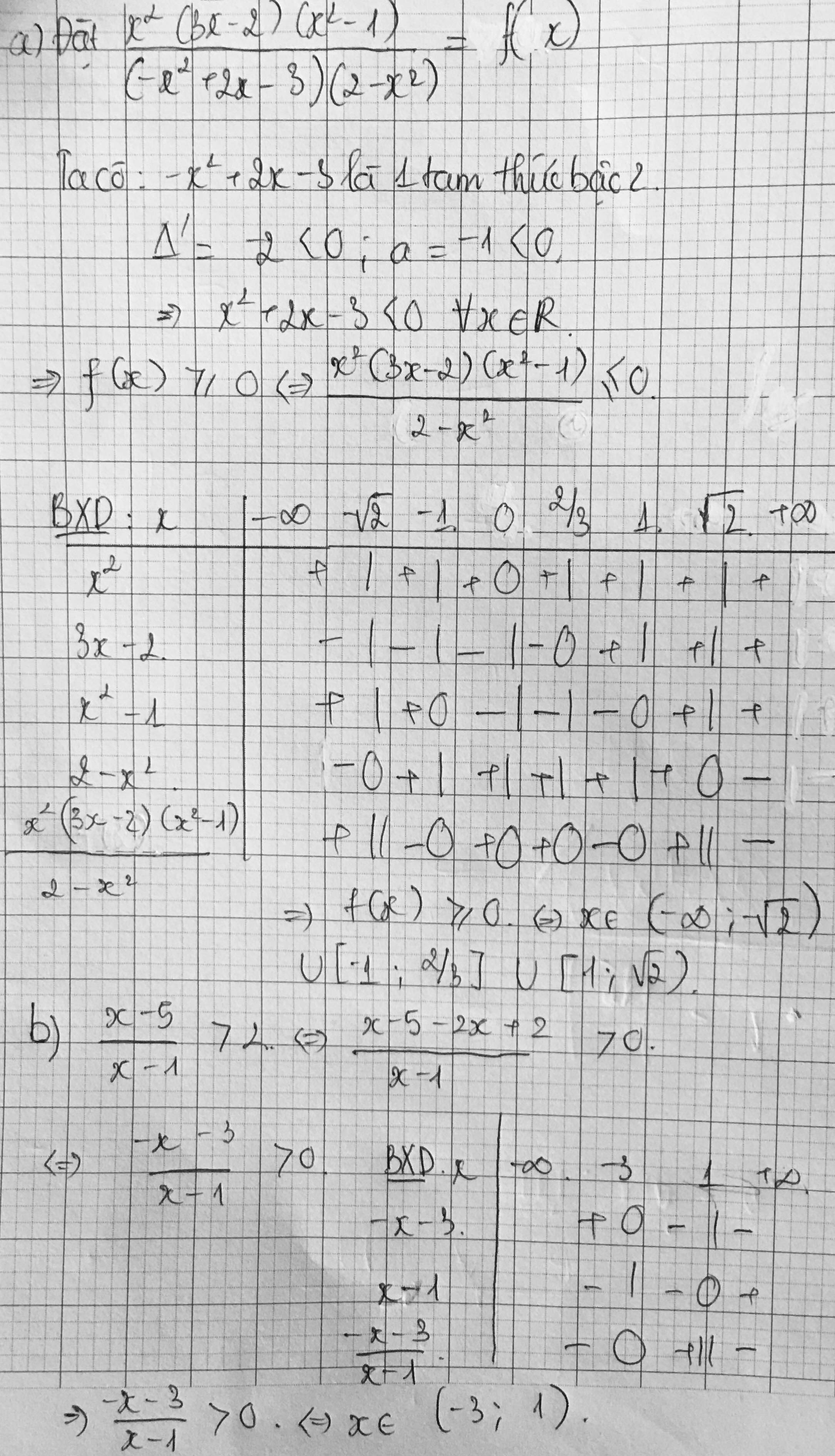Giải bất phương trình: \(\left|x^2-\sqrt{x-3}\right|< \left|x^2-2\right|+\left|2-\sqrt{x-3}\right|\)

Những câu hỏi liên quan
1.a, Giải phương trình \(\left(\sqrt{x 3}-\sqrt{x 1}\right)\left(x^2 \sqrt{x^2 4x 3}\right)=2x\)b, Giải hệ phương trình \(\left\{{}\begin{matrix}x^2\left(y^2 1\right) 2y\left(x^2 x 1\right)=3\\\left(x^2 x\right)\left(y^2 y\right)=1\end{matrix}\right....
Xem chi tiết
Giải các bất phương trình sau:
a/ \(\sqrt{\left(x-3\right)\left(8-x\right)}+26>-x^2+11x\)
b/ \(\left(x+1\right)\left(x+4\right)< 5\sqrt{x^2+5x+28}\)
GIÚP MÌNH VỚI Ạ!!!
Giải bất phương trình: \(\sqrt[4]{\left(x-2\right).\left(4-x\right)}+\sqrt[4]{x-2}+\sqrt[4]{4-x}+6x\sqrt{3x}\le x^3+30\)
giải bất phương trình \(\left(\sqrt{13}-\sqrt{2x^2-2x+5}-\sqrt{2x^2-4x+4}\right)\left(x^6-x^3+x^2-x+1\right)\ge0\)
Do \(x^6-x^3+x^2-x+1=\left(x^3-\dfrac{1}{2}\right)^2+\left(x-\dfrac{1}{2}\right)^2+\dfrac{1}{2}>0\) ; \(\forall x\) nên BPT tương đương:
\(\sqrt{13}-\sqrt{2x^2-2x+5}-\sqrt{2x^2-4x+4}\ge0\)
\(\Leftrightarrow\sqrt{4x^2-4x+10}+\sqrt{4x^2-8x+8}\le\sqrt{26}\) (1)
Ta có:
\(VT=\sqrt{\left(2x-1\right)^2+3^2}+\sqrt{\left(2-2x\right)^2+2^2}\ge\sqrt{\left(2x-1+2-2x\right)^2+\left(3+2\right)^2}=\sqrt{26}\) (2)
\(\Rightarrow\left(1\right);\left(2\right)\Rightarrow\sqrt{4x^2-4x+10}+\sqrt{4x^2-8x+8}=\sqrt{26}\)
Dấu "=" xảy ra khi và chỉ khi \(2\left(2x-1\right)=3\left(2-2x\right)\Leftrightarrow x=\dfrac{4}{5}\)
Vậy BPT có nghiệm duy nhất \(x=\dfrac{4}{5}\)
Đúng 1
Bình luận (0)
Giải các bất phương trình, hệ phương trìnha) dfrac{x^2left(3x-2right)left(x^2-1right)}{left(-x^2+2x-3right)left(2-xright)^2}ge0b) dfrac{x-5}{x-1}2c) 2x-sqrt{x^2-5x-14} 1d) x+sqrt{x^2-4x-5} 4e) left{{}begin{matrix}left(4-xright)left(x^2-2x-3right) 0x^2geleft(x^2-x-3right)^2end{matrix}right.
Đọc tiếp
Giải các bất phương trình, hệ phương trình
a) \(\dfrac{x^2\left(3x-2\right)\left(x^2-1\right)}{\left(-x^2+2x-3\right)\left(2-x\right)^2}\ge0\)
b) \(\dfrac{x-5}{x-1}>2\)
c) \(2x-\sqrt{x^2-5x-14}< 1\)
d) \(x+\sqrt{x^2-4x-5}< 4\)
e) \(\left\{{}\begin{matrix}\left(4-x\right)\left(x^2-2x-3\right)< 0\\x^2\ge\left(x^2-x-3\right)^2\end{matrix}\right.\)
Giải bất phương trình \(f'\left(x\right)>g'\left(x\right)\) biết rằng :
a) \(f\left(x\right)=x^3+x-\sqrt{2};g\left(x\right)=3x^2+x+\sqrt{2}\)
b) \(f\left(x\right)=2x^3-x^2+\sqrt{3};g\left(x\right)=x^3+\dfrac{x^2}{2}-\sqrt{3}\)
Lời giải:
a) Ta có f'(x) = 3x2 + 1, g(x) = 6x + 1. Do đó
f'(x) > g'(x) <=> 3x2 + 1 > 6x + 1 <=> 3x2 - 6x >0
<=> 3x(x - 2) > 0 <=> x > 2 hoặc x > 0 <=> x ∈ (-∞;0) ∪ (2;+∞).
b) Ta có f'(x) = 6x2 - 2x, g'(x) = 3x2 + x. Do đó
f'(x) > g'(x) <=> 6x2 - 2x > 3x2 + x <=> 3x2 - 3x > 0
<=> 3x(x - 1) > 0 <=> x > 1 hoặc x < 0 <=> x ∈ (-∞;0) ∪ (1;+∞).
Đúng 0
Bình luận (0)
Giải phương trình:
\(\frac{2\left(x-\sqrt{3}\right)\left(x-\sqrt{2}\right)}{\left(1-\sqrt{2}\right)\left(1-\sqrt{3}\right)}+\frac{3\left(x-1\right)\left(x-\sqrt{3}\right)}{\left(\sqrt{2}-1\right)\left(\sqrt{2}-\sqrt{3}\right)}+\frac{4\left(x-1\right)\left(x-\sqrt{2}\right)}{\left(\sqrt{3}-1\right)\left(\sqrt{3}-\sqrt{2}\right)}=3x-1\)
giải phương trình :
\(9\left(\sqrt{x+1}+\sqrt{x-2}\right)+1=4\left(\sqrt{\left(x+1\right)^3}-\sqrt{\left(x-2\right)^3}\right)\)
Giải các bất phương trình sau :
a) \(\left(x+1\right)\left(2x-1\right)+x\le3+2x^2\)
b) \(\left(x+1\right)\left(x+2\right)\left(x+3\right)-x>x^3+6x^2-5\)
c) \(x+\sqrt{x}>\left(2\sqrt{x}+3\right)\left(\sqrt{x}-1\right)\)
d) \(\left(\sqrt{1-x}+3\right)\left(2\sqrt{1-x}-5\right)>\sqrt{1-x}-3\)
lời giải
a)
\(\left(x+1\right)\left(2x-1\right)+x\le2x^2+3\)
\(\Leftrightarrow2x^2+x-1+x\le2x^2+3\)
\(\Leftrightarrow2x\le4\Rightarrow x\le2\)
\(\)b) \(\left(x+1\right)\left(x+2\right)\left(x+3\right)-x>x^3+6x^2-5\)
\(\left(x^2+3x+2\right)\left(x+3\right)-x>x^3+6x^2-5\)
\(x^3+3x^2+3x^2+9x+2x+6-x>x^3+6x^2-5\)
\(10x+6>-5\Rightarrow x>-\dfrac{11}{10}\)
Đúng 0
Bình luận (0)
c)Đkxđ: x\ge0
x+\sqrt{x}>\left(2\sqrt{x}+3\right)\left(\sqrt{x}-1\right)
\Leftrightarrow x+\sqrt{x}>2x+\sqrt{x}-3
\Leftrightarrow x-3>0
\Leftrightarrow x>3. (tmđk).
Đúng 0
Bình luận (0)
d) Đkxđ: \(1-x\ge0\)\(\Leftrightarrow x\le1\).
\(\left(\sqrt{1-x}+3\right)\left(2\sqrt{1-x}-5\right)>\sqrt{1-x}-3\)
Đặt \(\sqrt{1-x}=t\left(t\ge0\right)\) bpt trở thành:
\(\left(t+3\right)\left(2t-5\right)>t-3\)\(\Leftrightarrow2t^2+t-15>t-3\)
\(\Leftrightarrow2t^2>12\)\(\Leftrightarrow t^2>6\)\(\Leftrightarrow t>\sqrt{6}\) ( do \(t\ge0\) ).
Trở lại phép đặt: \(\sqrt{1-x}>\sqrt{6}\)\(\Leftrightarrow1-x>6\)\(\Leftrightarrow x< -5\).
Đúng 0
Bình luận (0)















![[ ]](https://hoc24.vn/images/avt/avt78337201_256by256.jpg)


